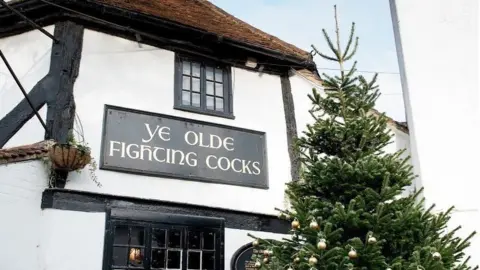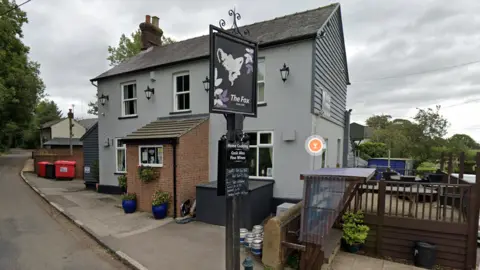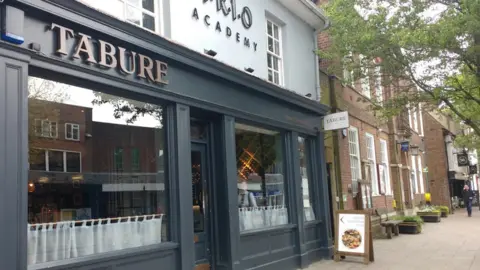Covid: Tier 3 status means dining pubs 'thrown to the wolves' in Beds and Herts
 Ye Olde Fighting Cocks
Ye Olde Fighting CocksWith much of England moving into tier three of coronavirus restrictions, pubs and restaurants in these "very high alert" areas can now only offer a takeaway and delivery service. How will hospitality businesses in Hertfordshire and Bedfordshire cope with the changes?

'You can write off all of next year too'
 Ye Olde Fighting Cocks
Ye Olde Fighting CocksYe Olde Fighting Cocks in St Albans dates back to AD793 and is reputed to be the the oldest pub in England, according to the Guinness Book of Records.
In has survived wars, plagues and economic crises, but the coronavirus pandemic has brought new challenges. After the first lockdown in March, the pub turned into a "supply point", providing fresh produce to the local community.
After November's lockdown, when the city was in tier two, it decided to only open at weekends, but landlord Christo Toffali took the decision to close completely last Saturday.
Tier two regulations meant drink could only be served with a "substantial meal" and, coupled with the lack of footfall past his out-of-the-city-centre pub, that meant he "just couldn't make it work financially".
Mr Toffali says they spent "huge amounts of money, sweat and tears becoming Covid-safe", and now tier three means they cannot let people inside to eat and drink.
"This year has been a nightmare for everyone, but the government has failed our industry completely," he says.
Mr Toffali says it is "making the same mistakes over and over again" and if a third spike hits, the government's "nonsensical restrictions, guidance and advice" will be responsible.
"We are running award-winning businesses, loved by local people, providing much-needed respite from the trials and challenges that 2020 has thrown at them - and we have been operating in a safe way, and still we are sacrificed," he said.
"You can write off all of next year too. Lives and livelihoods have been needlessly thrown away."

'Hospitality is closed whilst everyone can still shop till they drop'
 Andrei Lussmann
Andrei LussmannAndrei Lussmann owns six restaurants, including five in Hertfordshire, with his latest establishment in Hertford only just opening this month.
He says he has worked to overcome two lockdowns and, when the closure of restaurants was first announced in March, he set up a home delivery service which provided 28,000 items in its first 11 weeks.
Since then, he says his restaurants reopened when they could with all Covid safety measures in place and he was anticipating Christmas as a "morsel of opportunity to keep the lights on and mental resolve alive".
He says the latest announcement means they have been "thrown to the wolves".
"Hospitality - the safest public arena - has once again been closed at the last minute leading to huge amounts of wasted food and lost revenues," he says.
Mr Lussman says the government has a "hopeless grip on the data and lack of understanding about what is and isn't working in society with regard to the transmission of Covid".
"Under the pathetic veil of keeping the NHS safe and reducing the death rate, hospitality is closed whilst everyone can still shop till they drop, brushing shoulders with hundreds of others, and then go back to their homes where three families will be able to enjoy festive cheer galore, all the while helping to spread the virus," he says.
"Consistency, intelligence and a common-sense approach is what is needed."

'A decision a week or a fortnight ago would have been more acceptable'
 Google
GoogleAt the Fox Pub at Darley Hall in Luton, they were fully booked for Christmas and had spent about £4,000 on ordering food and drink, with about £500 alone spent on turkeys.
Owner Linda Layton says moving to tier three will have "an enormous impact".
"As any hospitality [establishment] will tell you, January is going to be really quiet, so this is when we take the money," she says.
"The government has been a bit naughty, because they knew we were going to have a busy week next week, we've ordered everything, including all the beer and everything to do with the bar and now that's all going to waste.
"If they'd made this decision a week or a fortnight ago, I think it would have been more acceptable, because then we wouldn't have put all the orders in."

Eat Out To Help Out 'displayed poor judgement right from the get-go'
 Google
GoogleMark Pearse is the owner of the Tabure restaurants in St Albans and Berkhamsted.
He says August's government-backed Eat Out to Help Out scheme and the booking "frenzy" that preceded the November lockdown had contributed to the spike in Covid-19 cases and the move to tier three.
"I thought Eat Out To Help Out displayed poor judgement right from the get-go," he says.
"I hoped for a steady stream of trade after lockdown one that would allow us to build a rhythm and let our business find its groove through winter into 2021."
Instead, he says the government helped to create a "rush of diners" who "clamber to get in before lockdown".
Earlier this week, some parts of south Hertfordshire were moved up to tier three and Mr Pearse says he "sighed with relief" because his two restaurants remained in tier two districts which he was hoping would see them through to Christmas.
"Alas again we find out we will also fall into tier three and instantly emails and phone calls fly in as the latest two-day boom starts to unfold. It's an absolute joke, a disgrace."
Mr Pearse said a 12-month strategy would have been much better than the "stress and damaged caused" by the changes of the last two months.
He says he would have favoured "a path for business, and therefore the economy, from July '20 to a July '21 where they allowed single-bubble dining throughout, instead of Eat Out To Help Out and the November lockdown with weeks of takeaways only".

When the new tier three restrictions were extended across Hertfordshire and Bedfordshire, a Department of Health and Social Care (DHSC) spokesman said it made the decision to move all the whole of those two counties to the more serious category because the situation had deteriorated, with case rates increasing by more than 30% in the last seven days in Hertfordshire alone.
It was this, plus the rise in daily Covid hospital admissions, that warranted the counties moving to the "very high alert" status, he adds.

Find BBC News: East of England on Facebook, Instagram and Twitter. If you have a story suggestion email [email protected]
